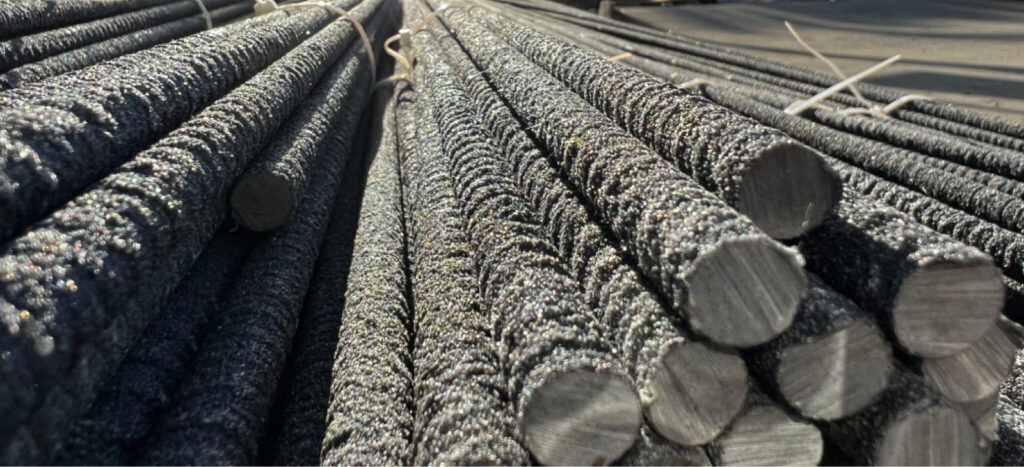
The construction industry is facing big challenges, especially with steel rebar which is the main material used in building. Steel rebar can easily rust, causing problems for buildings and costing a lot of money to fix. Finding a better alternative has become very important.
The Hidden Costs of Corrosion and Repair
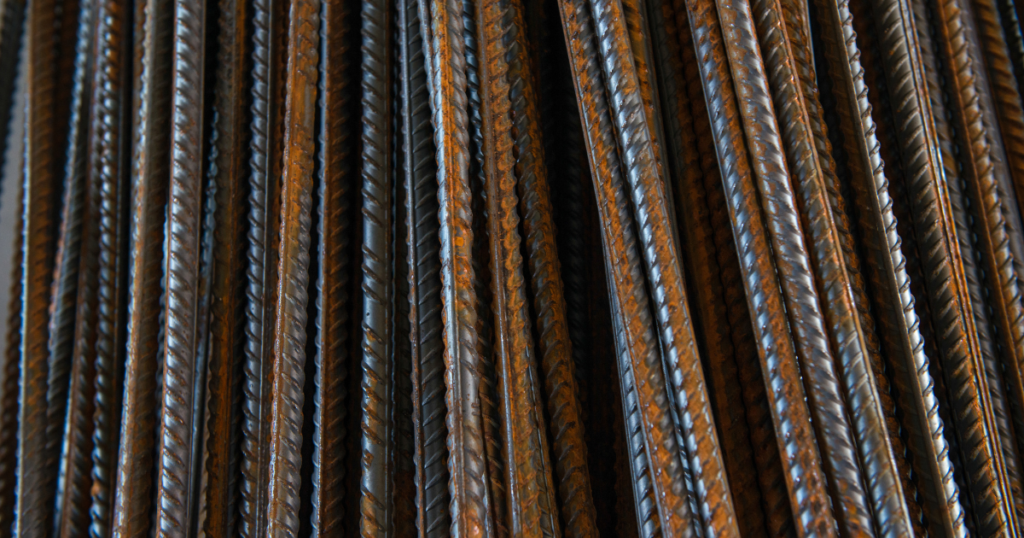
Steel’s vulnerability to corrosion and the consequential weakening of concrete from the inside is a ticking time bomb for infrastructure. Often, by the time corrosion is detected, the damage is far advanced, leading to costly repairs and maintenance. Traditional solutions, while somewhat effective, are merely band-aids on a larger issue.
A Revolutionary Alternative: GFRP Rebar
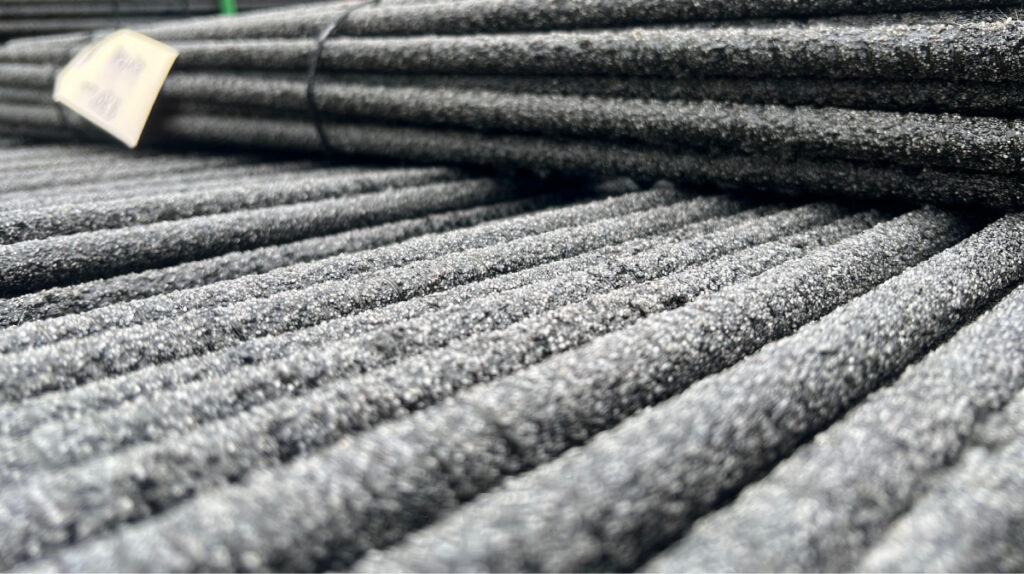
Enter Glass Fibre Reinforced Polymer (GFRP) rebar, a cutting-edge material manufactured through the pultrusion process and designed for durability. Comprising 80% high modulus E-glass fibre and 20% high-performance epoxy resin, GFRP rebar boasts a sand-coated surface for an enhanced bond with concrete, marking a significant improvement over traditional materials.
GFRP vs Steel: A Comparative Analysis
GFRP rebar outshines steel in tensile strength, capable of withstanding more than double the force in tension-heavy applications. However, it’s essential to note the lower flexural strength and modulus of elasticity, which influences the design considerations for GFRP-reinforced structures.
Tensile Strength and Durability
GFRP’s superior bond strength to concrete significantly reduces the risk of cracking, making it ideal for aqueous conditions where corrosion resistance is paramount. Its quarter weight compared to steel also simplifies transportation and handling, reducing overall project costs.
Design Considerations
While GFRP’s lower modulus of elasticity may require adjustments in structural design, such as larger section sizes or higher reinforcement ratios, the benefits in durability and maintenance cost savings are undeniable.
Danterr’s GFRP Products
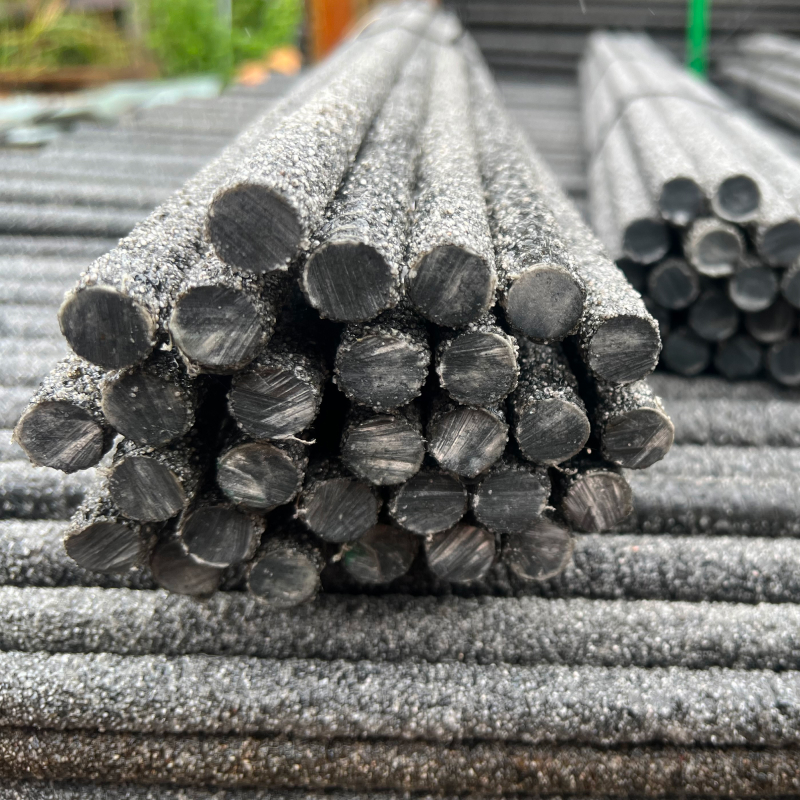
Features: GFRP rebar is a lightweight, non-corrosive reinforcement solution with a high tensile strength, designed to combat the limitations of traditional steel rebar. Manufactured from glass fibre reinforced polymer, it offers a unique combination of durability and performance, resistant to chemical attack and environmental degradation.
Benefits: Its non-corrosive nature eliminates the risk of steel rebar’s corrosion-related weaknesses, significantly extending the lifespan of concrete structures. The high tensile strength allows for less material to be used while maintaining or improving structural integrity. Additionally, its lightweight nature reduces transport and handling costs, and the risk of injury on site.
Applications: GFRP rebar is ideal for use in environments where corrosion is a concern, such as tunnels, bridges, and coastline reinforcements. It is also suitable for structures requiring electromagnetic transparency, such as those near sensitive electronic equipment.
Technical Specifications:
- Diameter Range: Available in diameters from 8mm to 32mm, catering to a wide range of structural requirements.
- Lengths: Custom lengths from 0.2m to 12m, allowing for versatility and minimal waste in various construction projects.
Features: Composed of GFRP bars tied together, GFRP Mesh is a flexible reinforcement solution offering high tensile strength and corrosion resistance. It is available in various sizes and configurations to suit different applications.
Benefits: GFRP Mesh reduces the need for heavy lifting equipment and simplifies the construction process with its easy transport and handling. Its corrosion resistance ensures longevity, and its electromagnetic transparency makes it suitable for use in projects requiring no interference with signals or sensors.
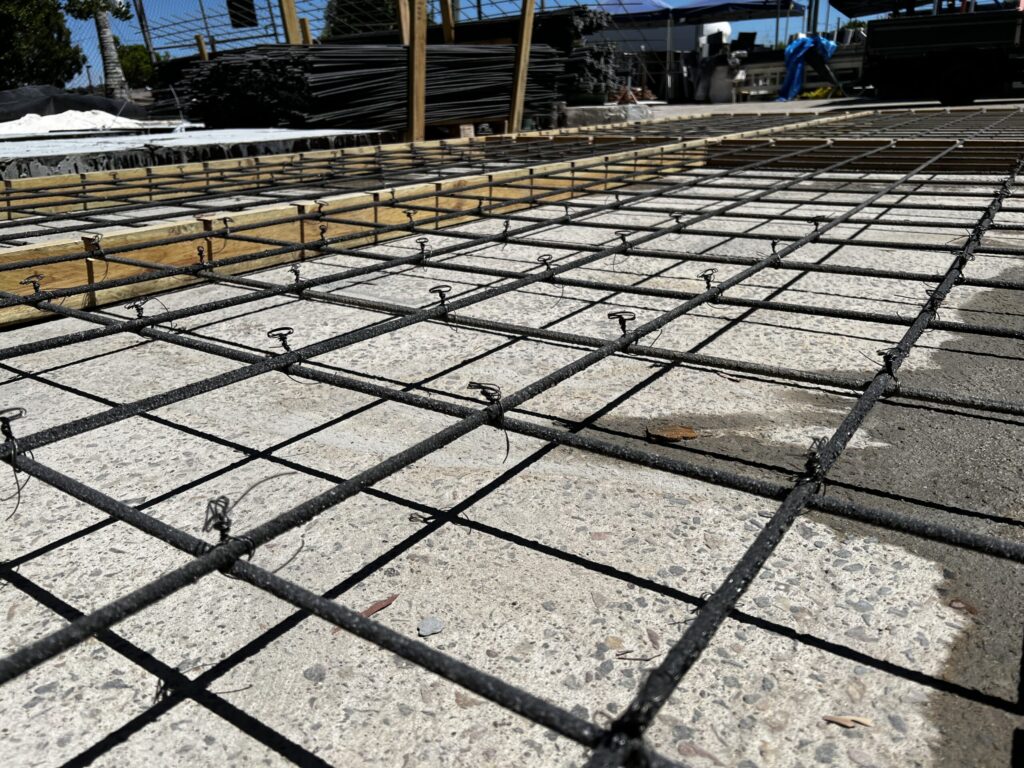
Applications: It is extensively used in marine constructions, slabs, foundations, and precast products, providing an efficient and durable alternative to traditional steel mesh, especially in corrosive environments.
Technical Specifications:
- Bar Diameter: Ranges from 8mm to 16mm, providing a robust reinforcement solution.
- Sheet Sizes: Customizable, with standard options including 6×2.4m or 4.2×2.4m, to fit various project sizes and shapes efficiently.
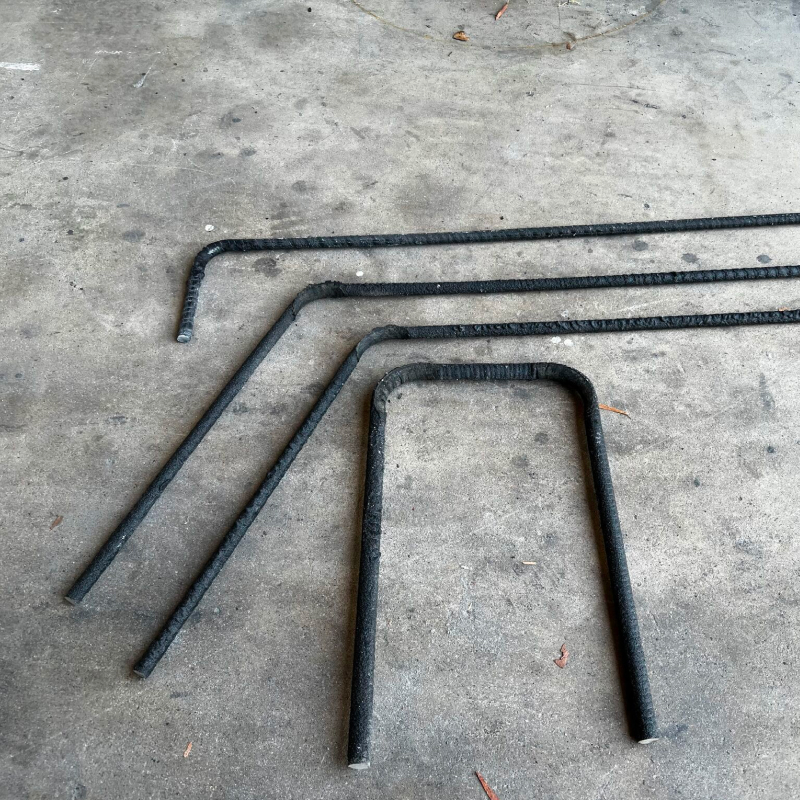
Features: The Fibreglass Reinforcing Bent Bar offers a range of custom-shaped bars, including L-bars, spirals, and stirrups, tailored to precise project specifications. Unlike traditional steel rebars, GFRP Bent Bars are designed with high tensile strength and exceptional corrosion resistance, characteristic of glass fibre reinforced polymer. An important consideration is that once GFRP rebars are manufactured into their designated shapes, they cannot be reshaped. This inherent property underscores the need for precise planning and design in the use of GFRP Bent Bars in construction projects.
Benefits: Crafting bars into specific shapes and sizes from the outset significantly reduces waste and eliminates the need for on-site labour associated with bending and cutting, ensuring a perfect fit for complex reinforcement layouts. The non-corrosive nature of these bars considerably extends the lifespan of concrete elements, making them highly suitable for use in aggressive environments where traditional steel rebar would fail.
Applications: The precision and durability of GFRP Bent Bars make them especially valuable for complex structural components, ligatures, corner bars, and any application where exact reinforcement is crucial. They are extensively used across various construction sectors, including large-scale infrastructure projects and intricate architectural designs, where their pre-manufactured shapes facilitate efficiency and structural integrity.
Technical Specifications:
- Diameter Range: Available from 8mm to 24mm, accommodating a broad spectrum of reinforcement needs.
- Shapes: Custom shapes including L-bars, spirals, stirrups, with maximum dimensions up to 700x1500mm, tailored to specific project requirements.
Features: GFRP Dowels are designed for use as load transfer devices between joints in concrete slabs. They are non-corrosive, offer high tensile strength, and are electromagnetically transparent.
Benefits: The non-corrosive property ensures that they do not contribute to joint weakening over time. Their lower stiffness compared to steel reduces stress concentrations in the concrete, prolonging the structure’s life. Electromagnetic transparency allows for their use in areas with sensitive equipment.
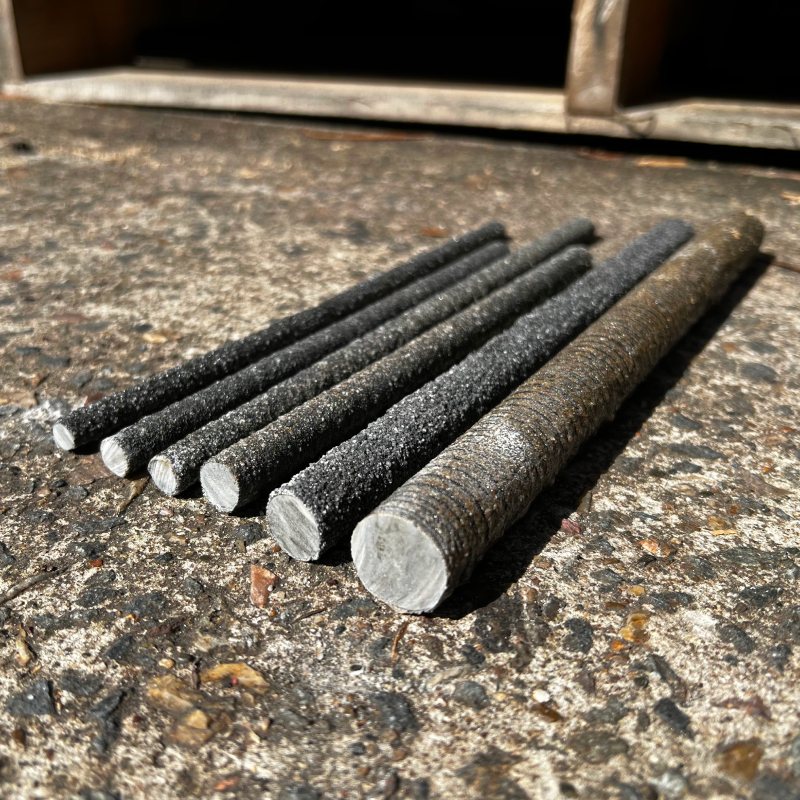
Applications: Ideal for general construction, precast products, and anywhere requiring effective load transfer in concrete slabs without the risk of corrosion. They are also beneficial in applications sensitive to magnetic interference, such as near induction sensors in toll booths or medical equipment.
Technical Specifications:
- Diameter Range: 12mm to 24mm diameters, designed for optimal load transfer between concrete slabs.
- Lengths: Customizable to project needs, ensuring a perfect fit and efficient load distribution.
As we navigate through the transformative potential of Glass Fibre Reinforced Polymer (GFRP) rebar in the construction industry, it’s evident that GFRP is not just an alternative but a superior solution for modern building challenges. With its unparalleled durability, corrosion resistance, and environmental benefits, GFRP rebar is setting new benchmarks for sustainability and efficiency in construction. It offers a compelling choice for those looking to reduce environmental impact, enhance structural integrity, and optimise construction costs.
The diverse applications of GFRP—from reinforcing tunnels and bridges to providing electromagnetic transparency in sensitive environments—underscore its versatility and readiness to meet the demands of contemporary construction projects. As the industry evolves, embracing GFRP rebar signifies a commitment to innovation, resilience, and sustainability.
Ready to Lead the Way in Construction Innovation?
Danterr is at the forefront of supplying GFRP rebar solutions that are transforming the construction industry. Our expertise and range of products are designed to meet your project’s specific
needs, ensuring that you stay ahead in building safer, longer-lasting, and more cost-effective structures.
Discover how Danterr’s GFRP rebar can elevate your next project. For more information, reach out to us at sales@danterr.com or call us at 1800 262 383. Let’s build the future together with sustainable, innovative solutions that pave the way for a new era of construction.
Frequently Asked Questions
GFRP rebar is non-corrosive, has a higher tensile strength, and is lighter than steel, making it more durable and cost-effective over the long term.
Yes, GFRP mesh can be used in a wide range of applications, offering the added benefits of corrosion resistance and reduced weight.
GFRP bent bars provide superior tensile strength and are non-corrosive, though they must be pre-shaped as they cannot be bent on-site.
GFRP dowels offer excellent load transfer in concrete slabs without the risk of corrosion, making them ideal for long-lasting construction projects.
While the installation principles are similar, GFRP’s lighter weight makes handling and installation easier and more efficient.
Initially, GFRP may be more expensive than steel, but its durability and low maintenance requirements make it more cost-effective over time.
Stay Updated with Danterr!
Subscribe to Our Newsletter for the Latest in Construction Solutions
